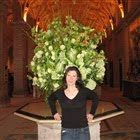
Author's Biography. Ali Eteraz is a writer and free-lance journalist. Born into a nomadic family in Lahore, Pakistan, he was raised in the Middle East, Pakistan and the Caribbean, and has lived in ten American states. He studied philosophy in college, where he wrote his honors thesis on Nietzsche. Later he attended law school where he earned a fellowship in public service and interned on human rights cases. After a short stint working in the area of corporate litigation he switched to a writing career. He is currently a contributor to The Guardian, True/Slant, and Dawn, Pakistan’s largest and oldest English language daily. His articles have appeared in Dissent, Foreign Policy, Parabola, Open Democracy and Alternet, among others, and have been linked by hundreds of blogs, including NYTimes, The Atlantic and Time Magazine.
Ali is the author of the prose work Children of Dust, which is scheduled to be released on October 13 2009 by Harper One, an imprint of Harper Collins. Upon reading an early excerpt from the book, the late philosopher and literary critic, Richard Rorty, stated he was “particularly impressed” by the “powerfully written” work.
Review. Before Ali Eteraz aka Amir ur Islam aka Abu Bakr Ramaq aka Amir aka Abir ul Islam was born his father promised God that he would be a great leader and a servant of Islam. Children of Dust by Ali Eteraz is a memoir of the author’s coming to terms with that accord or mannat.
The Table of Contents reads like a map of Eteraz’s geographical and personal journey. In Book One: The Promised -- Abir ul Islam (Perfume of Islam) he is a child living in Pakistan attending a religious school (madrassa) to memorize the Quran. In Book Two – The American – Amir, he is a teen living in the Bible Belt trying to blend in with his new American peers. In Book Three – The Fundamentalist – Abu Bakr Ramaq (Spark of Light) he is attending college in Manhattan and embraces Islamic fundamentalism. Book Three follows his disappointing return to Pakistan where his old friends reject him as “too American.” In Book Four – The Post Modern – Amir ul Islam he inwardly adopts anti-Islamic ideas at his new university while outwardly feigning Islamic piety. The final book, Book Five details the author’s transformation to Ali Eteraz (Noble Protest) in which he becomes an activist against the violence committed in the name of Islam.
Eteraz is a gifted writer covering a wide swath of emotions in Children of Dust. When describing an unexpected emotional awakening at party in Dubai with Pakistani laborers, Eteraz lyrically writes:
It [a song] melted away my skin and sinew and made me a part of the men around me. These men who were raised from dust, lived in dust, and would eventually rest in dust. I felt one with them. I was not alone. We were many. We were all children of dust.
At other turns, Eteraz hones a light comedic touch such as this passage:
A Muslim leader [he was president of his university’s Muslim Students Association] . . . had to be what others thought a perfect Muslim should be. The trouble, of course, was that I was far removed from piety . . . and therefore the only solutions were to genuinely achieve piety or fake.
As a true postmodernist I opted for the latter and called it art . . . .
The only disappointment came at the end of the book when Eteraz leaves loose ends concerning his family.
Overall, Children of Dust is a riveting story of one man’s quest to fulfill his pre-birth covenant.
Publisher: HarperOne; 1st edition (October 13, 2009), 352 pages
Review Copy Provided Courtesy of the publisher and FSB Associates.




Memorize the Koran? That seems like quite an undertaking. Funny how it relates to memorizing something I have been thinking about recently. I always wonder.... How many people have that whole thing memorized?
ReplyDeleteI love reading books that give us a glimpse into the window of another culture. That's why I loved Three Cups of Tea. I will add this book to my TBR list. Thanks for sharing your review!
ReplyDelete